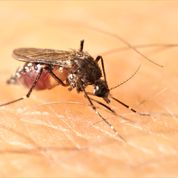BY PATRICK ALDERTON
Researchers from the University of Newcastle have teamed up with the CSIRO, the NSW Department of Health, and the University of Melbourne to tackle the mosquito-borne Ross River Virus.
The three-year project will use genomic sequencing, aiming to inform suppression strategies for the Aedes Vigilax species in the Hunter, Lake Macquarie and Port Stephens areas.
The Aedes Vigilax species, originating from coastal wetland areas such as swamps, mangroves and salt marshes, has one of the most widespread populations in Australia, and can fly many kilometres in a lifetime.
CSIRO researcher Brendan Trewin says the project will be influenced by new advances in genomic sequencing to look at closely related mosquito populations and determine relationships between them.
"Advances in technology mean we can sequence tiny amounts of DNA to track genetic differences of individual mosquito genomes and find distinct populations" Dr Trewin said.
The CSIRO has extensive experience working to prevent the spread of mosquito-borne diseases.
 |
| Pictured: Aedes Vigilax mosquito Image supplied by CSIRO |
